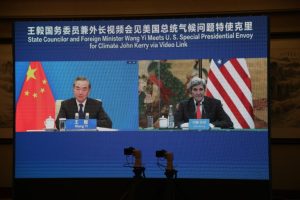In 2014, a year ahead of the U.N. climate change conference that would result in the Paris Agreement, the United States and China unveiled a bilateral climate change announcement. The declaration from Chinese President Xi Jinping and then-U.S. President Barack Obama set the stage for the current high-water mark in global climate cooperation.
Fast forward seven years, however, and a repeat of that cooperation looks tenuous amid severely strained China-U.S. relationship. Foreign Minister Wang Yi memorably dismissed the idea that climate change cooperation could be an “oasis” for bilateral relation, remarking that “if the oasis is all surrounded by deserts, then sooner or later, the ‘oasis’ will be desertified.”
Where does China-U.S. climate cooperation stand today, and what are the implications for the health of the planet?
In this interview, Li Shuo, senior climate and energy policy officer at Greenpeace East Asia, discusses China’s unilateral climate moves as well as its climate diplomacy, including with the United States. Despite lingering tensions, Li sees climate change as a bright spot for China’s relationship with the world: “Is there a second area where China made several major political moves within a decade toward the better of global governance? Probably not.”
The U.S. special envoy for climate, John Kerry, has visited China twice in less than a year, with a trip to Shanghai in April and a follow-up visit to Tianjin in September. How did you evaluate his trips, and what does that tell us about the broader prospects for China-U.S. climate change cooperation?
The U.S.-China exchanges so far this year made one point clear to me – when it comes to climate change, engagement matters. The G-2 will certainly not go back to the cooperation seen during the Xi-Obama period. But that doesn’t mean there is no need for them to engage. In fact, climate change, unlike many other bilateral issues, can truly not afford decoupling. The climate crisis won’t just go away if Beijing or Washington shut communication channels.
Kerry’s China trips have demonstrated the value of engagement. The joint statement issued in Shanghai had a few notable U.S. diplomatic wins. Among them, it’s the first time that the founding principle of global climate politics – common but differentiated responsibilities – was not cited in a U.S.-China bilateral statement. This represents the growing readiness of China to shoulder more climate responsibilities, something that the U.S. has always wanted.
The Tianjin visit did not yield any immediate outcome. But weeks after Kerry’s trip, President Xi announced an overseas coal [power project] moratorium at the UNGA [United Nations General Assembly]. Without international engagement, China will be under no rush to cut a profitable area of its overseas business.
One of the prevailing narratives in Washington is, “the Chinese are tricking us into a climate conversation to extract concessions elsewhere.” That narrative can’t be further from fact. What exactly did China get from the U.S. by announcing an overseas coal moratorium, the ratification of the Kigali Amendment (which the U.S. has not done so far), and carbon neutrality?
China is making these incremental moves when the U.S. has barely done anything concrete on the climate front. The global community has learnt not to take what Washington declares at face value. This applies to Biden’s 2030 emission reduction target and his latest climate finance commitment – all solid on paper, but with a slim chance to be actually fulfilled. The willingness of China to progress on the climate agenda in light of Washington’s chronic “overpromise and underdeliver” syndrome is worth noting. In 20 years time, this dynamic will shape which one of the G-2 ventures further on climate action.

































